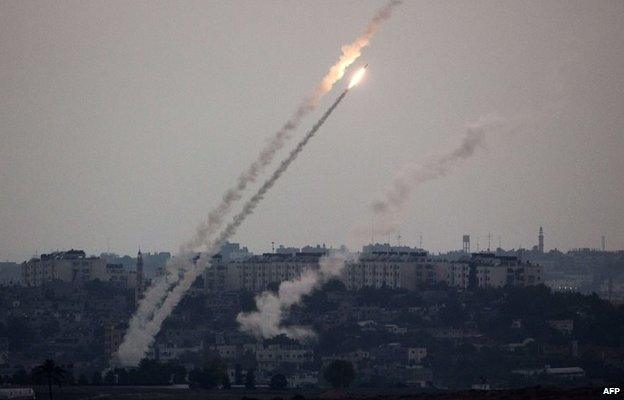Amnesty: Israeli strikes on Gaza buildings 'war crimes'
- Published

The al-Basha Tower - which housed TV and radio stations, as well as about 30 flats - was flattened
Israeli air strikes on four high-rise buildings in the final days of this summer's conflict in Gaza amounted to war crimes, Amnesty International says.
Evidence suggested the destruction was "carried out deliberately and with no military justification", a new report, external by the human rights group found.
It called for an independent and impartial investigation to be opened.
Israel said the report made unfounded allegations, external and ignored Hamas' use of the buildings for military purposes.
In a statement, the Israeli embassy in London said Amnesty should be investigating the Palestinian rocket attacks on Israeli civilians instead.
'No military justification'
The 50-day conflict in Gaza between Israel and militant groups led by Hamas left at least 2,189 Palestinians dead, including more than 1,486 civilians, according to the UN, and 11,000 injured. On the Israeli side, 67 soldiers and six civilians were killed, with scores more wounded.
During the last four days before a ceasefire came into effect, Israeli warplanes dropped large bombs on four buildings - the 12-storey Zafer 4 Tower, the 16-storey Italian Complex and the 13-storey al-Basha Tower in Gaza City, and the four-storey Municipal Commercial Centre in Rafah.

The Zafer 4 Tower - home to some 44 families - was reduced to rubble
Amnesty acknowledged that in all four cases no-one was killed because the Israeli military took measures to ensure residents left the building before they were destroyed - by telling some in telephone calls to evacuate, and also firing "knock-on-the-roof" warning missiles.
But the group said scores of people from nearby buildings were injured and that hundreds were devastated to lose their homes, businesses and belongings.
Amnesty said the Israeli authorities had provided no information as to why they destroyed the four buildings, other than the suggestion that one of the destroyed buildings housed a Hamas command centre and "facilities linked to Palestinian militants" in another.
"All the evidence we have shows this large-scale destruction was carried out deliberately and with no military justification," said Amnesty's Middle East and North Africa director, Philip Luther.

The strike on the Italian Complex - which contained about 50 flats - caused one side of the tower to collapse
"Both the facts on the ground and statements made by Israeli military spokespeople at the time indicate that the attacks were a collective punishment against the people of Gaza and were designed to destroy their already precarious livelihoods."
Mr Luther added that even if the Israeli authorities believed part of a building was being used for military purposes, they had an "obligation to choose means and methods of attack that would minimise harm to civilians and their property".
'Complied with law'
The Israeli embassy in London criticised Amnesty's report for choosing to "focus on monetary losses to Palestinian civilians, rather than investigate the systematic and deliberate firing of rockets and mortars at Israel's civilian population".

Israel said Amnesty should have investigated rocket and mortar attacks on Israeli civilians
The Israeli military did not intentionally target civilians or civilian property, complied with international law, was directed by military objectives, and abided by the principle of proportionality, the statement said.
Releasing information that would disclose in detail the target of the strikes might jeopardise classified information and intelligence sources, it added.
"Third, and most blatantly, Amnesty ignores the clear evidence that Hamas systematically and deliberately used civilian infrastructure for military purposes. Amnesty's inability to determine the military use of these sites does not indicate a lack of such use."
Amnesty said a forthcoming report would focus on violations of international humanitarian law by Hamas.